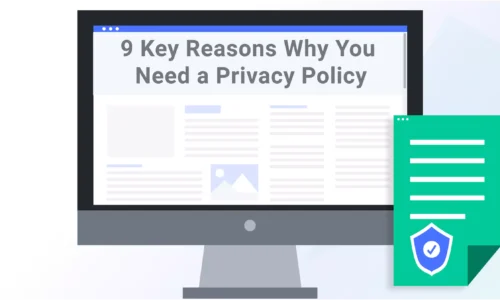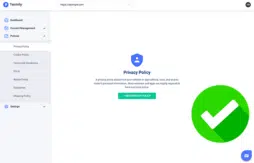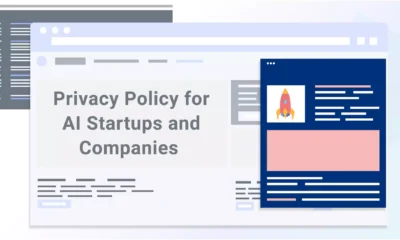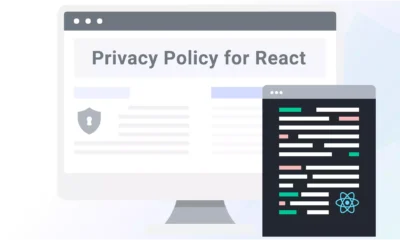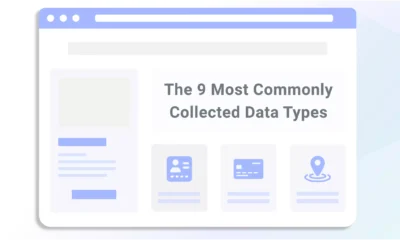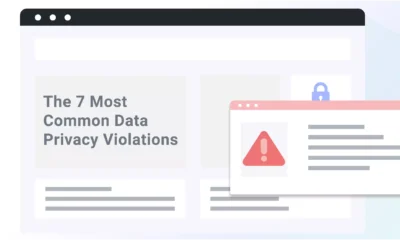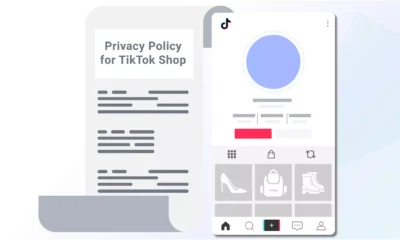A privacy policy is a document on your website that informs users about how you collect their information, why you use it, and if you share it with others.
It’s an essential policy businesses need in order to meet legal requirements and to build and maintain user trust.
Below, I explain why a privacy policy is important, it’s purpose, and why you need one.
Why Is a Privacy Policy Important?
A privacy policy is an important legal document that informs people about your personal data collection and processing activities.
The purpose of a privacy policy is to show the people you interact with that you take privacy seriously within your business.
Since many companies have online stores that collect user information, it’s vital to communicate how you collect, use, and protect their data.
While having a privacy policy is the proper thing to do, several laws also explicitly require businesses to have one, including the General Data Protection Regulation (GDPR) and the California Consumer Privacy Act (CCPA).
For those still uncertain about why you need a privacy policy, avoiding hefty fines for noncompliance with privacy laws is a strong motivator.
What Does a Good Privacy Policy Look Like?
Good privacy policies are short, clear, and thorough — unfortunately, not all policies meet the mark — but the clearer it is for users, the fewer problems you’ll have from misinterpretations.
A basic privacy policy should cover:
- Your company contact information
- What personal information you collect
- Why you collect it
- How you use it (i.e., your purpose or legal basis)
- If you share it or sell it to third parties
- If you transfer it internationally
- What rights individuals have over their data
- How individuals can act on their rights
The details you include in your privacy policy must comply with all applicable privacy laws, which change often to keep up with technology and public needs.
Experts say our current privacy laws are still inadequate, so have processes in place to update your privacy policy regularly.
9 Reasons Why You Need a Privacy Policy
In the past, privacy policies were long documents most people ignored — but not anymore.
The modern consumer expects to find a privacy policy on your site, and not having one could lead to other issues besides legal violations.
In the next section, I’ll describe the nine essential reasons you need a privacy policy.
1. It’s the Law
I’ll start with the biggest reason businesses need privacy policies — legal compliance.
Several data privacy laws require businesses to notify consumers about the data they collect and how it gets used, and posting a privacy policy helps you efficiently meet those standards.
European Privacy Laws
Businesses based in Europe or whose services are available there and monitor the online behavior of users in the European Union (EU) and European Economic Area (EEA) must comply with the General Data Protection Regulation (GDPR).
The GDPR requires businesses to follow the seven principles of privacy by design (PbD), which includes transparency over your data processing activities.
You must also have a GDPR-compliant privacy policy that meets specific legal requirements, including the following:
- Easy to find and read
- Free and accessible
- Transparent, accurate, and up to date
- Presented to users at or before the point of data collection
As of 2021, 97% of privacy policies fail to meet the GDPR’s standards.
US Privacy Laws
In the U.S., depending on what industry you work in, the following federal laws may apply and require you to have a privacy policy:
- Children’s Online Privacy Protection Act (COPPA) — applies to websites marketed to children under 13.
- Health Insurance Portability and Accountability Act (HIPAA) — applies to medical professionals, like dentists and doctors.
Several U.S. states also passed data privacy laws that are currently in force or will enter into action over the next few years, and all of them require a privacy policy, including the:
- California Consumer Protection Act (CCPA)
- Colorado Privacy Act (CPA)
- Connecticut Personal Data Privacy Act (CTDPA)
- Virginia Consumer Data Protection Act (VCDPA)
Other Privacy Laws Around the World
Data privacy laws exist worldwide, and most require a privacy policy.
For example, the following legislation governs how entities communicate their data collection and processing activities:
- Australia’s Privacy Act 1988
- Brazil’s General Personal Data Protection Law (LGPD)
- Canada’s Personal Information and Electronics Documents Act (PIPEDA)
- China’s Personal Information Protection Law (PIPL)
- New Zealand’s Privacy Act 2020
- Quebec’s Law 25
If you violate any of these data privacy laws, even by accident, you could face significant fines and be required to stop processing data.
2. Third-Party Apps and Services Require It
Most online businesses rely on third-party apps and services to assist with various processes, and many of those services require you to post a privacy policy.
These third-party entities often handle a lot of personal information.
Due to their size, they also usually need to follow several data privacy laws and want to ensure their customers aren’t doing anything that could get them into trouble.
To prevent privacy violations from occurring, they require privacy policies to ensure their business customers aren’t in contention with applicable laws and to remove some liabilities from their own plates.
For example, Google and Apple both require anyone working with their software to use one, including for services like:
- Google AdSense
- Google Analytics
- Apple Business Manager
If you plan on using one of the above third-party resources or something similar, chances are high that you’ll need a privacy policy.
3. It Builds Trust With Your Customers
Posting a privacy policy describing your processing activities to consumers helps build and maintain their trust.
The modern consumer cares more about their online privacy today than ever before.
Just check out these data privacy statistics:
- 48% of users stopped shopping with a company because of privacy concerns. (Tableau)
- 92% of Americans are concerned about their privacy when using the internet. (TrustArc)
- 76% of users believe companies must do more to protect their data online. (Global Consumer State of Mind Report 2021)
Having a comprehensive privacy policy shows your current and potential customers that you also care about the integrity and safety of their privacy.
Explaining why and how you use their data shows you care about the user experience, leading to stronger customer retention.
4. It Helps Keep Your Customers Informed
Online consumers understand that most websites track data about them, and they want to know what that tracking looks like and the controls they have over their information.
Keep them adequately informed by providing an accurate, up-to-date privacy policy.
Your customers want to know that you respect their privacy concerns and feel more comfortable with a business that is open about how it stores and uses their personal information.
Plus, according to the following statistics, a good privacy policy also has the added benefit of being a strong marketing tool:
- 88% of users say their willingness to share personal data depends on how much they trust a company. (PwC)
- 58% of users said they’re willing to share data to avoid paying for online content. (Statista)
- 60% of users say they would spend more money with a brand they trust to handle their personal data responsibly. (Global Consumer State of Mind Report 2021)
- 84% of users are more loyal to companies with strong security controls. (Salesforce)
5. It Shows a Security-First Stance
People care about their privacy, and with the number of data breaches and cybercrimes increasing, it’s easy for anyone to feel scared or unsafe.
After all, they are entrusting you with intimate details about their lives.
As a reflection of your company’s values, your privacy policy can show how much you respect their security.
6. It Helps You Avoid Legal Battles and Fines
If nothing else convinces you to have a privacy policy, the threat of legal action should.
If you collect data without a clear privacy policy, you expose yourself to potential fines and lawsuits.
For example, here’s a list of some of the biggest GDPR fines of all time:
- Meta was fined €1.2 billion ($1.3 billion) for transferring data collected from Facebook users in Europe to the US, violating GDPR international transfer guidelines.
- Amazon was fined €746 million ($780.9 million) for collecting user information without adequately obtaining their consent.
- WhatsApp (Meta) was fined €225 million ($247 million) for unclear privacy policies and lack of transparency over how they use and share data.
If you want to put more concrete numbers to the penalties, here are the violations you will face for non-compliance with some major privacy acts:
- GDPR: 2% of your worldwide annual turnover or up to €10 million ($12 million), whatever is highest.
- CCPA: Up to $2,500 per violation and up to $7,500 for intentional violations or violations involving known children.
- CPA: Between $2,000 to $20,000 per violation.
- COPPA: Up to $43,792 per violation
- CTDPA: Up to $5,000 per willful violation.
- HIPPA: Tier 1 fines charge from $100 to $50,000 per offense; Tier 4 charges have no upper limit.
- VCDPA: Up to $7,500 per violation.
- PIPEDA: Violation can result in a fine of up to CAD 100,000 ($79,815)
- Quebec’s Law 25: Between $15,000 and $25,000,000, or 4% of worldwide turnover, whatever is higher.
7. It Has SEO and Marketing Benefits
If you don’t have a privacy policy yet, adding one could help your site send better signals to search engines, improving your Search Engine Optimization (SEO).
While no one can know for sure, algorithms may prioritize websites with linked privacy policies over those without because it signifies proper security.
In addition, many ad sellers require a privacy policy before running ads on your site, so not having one can severely cut your bottom line.
The laws requiring privacy policies have been around long enough that people and search engine algorithms alike will find a site much less trustworthy if it doesn’t have a privacy policy.
8. Keeping Up With New and Changing Technology
Websites that have privacy policies appear more up-to-date and modern than those that don’t feature one.
Technology advances at a quick pace, which impacts laws and legislation as well as user expectations, which are also constantly evolving and changing.
Privacy policies will likely be required for more uses in the future.
So, if you don’t have a privacy policy today, consumers might assume you can’t keep up with this new and changing technology — like Artificial Intelligence (AI) or Global Privacy Controls (GPCs).
Without a privacy policy accounting for new developments, you’re also opening yourself up to liabilities that didn’t exist even just a few years ago.
9. Having a Privacy Policy Is the Right Thing To Do
According to modern ethicists, having a privacy policy on your website or app is simply the right thing to do.
You expect your neighbors not to walk into your home without your permission — holding your neighbors on the internet to the same standard is essential.
If you’re using personal information from your users to enhance aspects of your business, you owe it to them to be honest and transparent about:
- What data you’re collecting
- How you use it
- If you’re sharing it with others
You also owe it to them to keep that information safe and secure from unauthorized access and data breaches.
After all, it’s their information, so treat it with respect.
Nearly everyone is a data source for companies, analysts, and even the occasional bad actors. They have the right to know what’s happening to their information to make informed decisions on who they give it to.
People are calling for greater privacy rights, and accommodating them by posting a clear, up-to-date privacy policy is an easy, effective way to make the internet safer for all of us.
The Growing Purpose of a Privacy Policy
Today, privacy policies aim to provide consumers with transparency and choice — a purpose that continues to grow with advancing AI access and new and amended privacy laws.
Remember, privacy policies don’t exist to make business owners’ lives harder by telling them what to do. They’re meant to inform the world about what your business does, which is why it’s such a strong reflection of your company values.
Your customers can better understand the parts of your organization that concern them, just like you get to look at aspects of their lives relevant to your services.
It’s a two-way street that will evolve and become more critical with time.
Set your business up for success today by posting an accurate, honest privacy policy.
How Can You Make a Privacy Policy for Your Website or App?
Now that you know why you need a privacy policy, let’s discuss how to make one for your website or app.
Use a Privacy Policy Generator
If you want to quickly and easily make a privacy policy for your business, use a managed solution like Termly’s Privacy Policy Generator.
At Termly, we’re committed to protecting the privacy of our users and offer solutions you can genuinely trust.
Our Generator does all of the hard work for you; you only need to answer simple questions about your business and its data processing activities. The generator then makes a unique policy based on your answers, which you can easily embed on your website or app.
It includes clauses to follow several data privacy laws and works for businesses in any industry.
See what it looks like in the screenshot below.
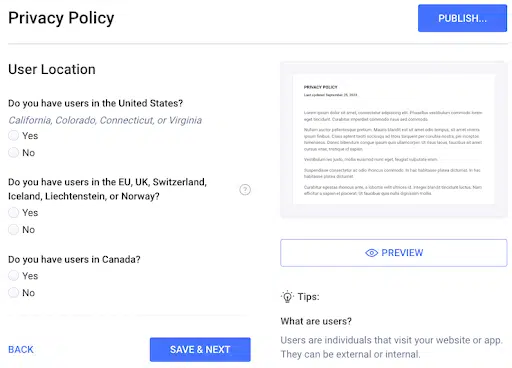
Use a Free Template
You can also use our free privacy policy template.
Templates take more work to fill out, but ours is already correctly formatted and include standard clauses that appear in most privacy policies.
You just need to fill in the blank sections with accurate information about your company.
We recommend free templates for businesses that collect minimal amounts of personal data.
Do-It-Yourself
Writing your own privacy policy is also possible, but you should only attempt this if you have extensive legal knowledge.
Privacy policies must be easy to read and understand, but they must also contain specific information depending on what laws apply to your business.
You don’t want to risk accidentally leaving out vital information and getting fined for violating an applicable data privacy law.
For more help, check out our guide on how to write your own privacy policy.
Summary
If you use personal information from the people who visit your website for business purposes, the least you can do is keep them properly informed about your data processing activities.
Every website should have a clear, meaningful privacy policy.
Laws worldwide require businesses of all kinds to post them, and your customers expect to find one on your site.
Free templates and comprehensive privacy policy generators make it easy to make one of these policies for your site or app, so add one to your site today.

